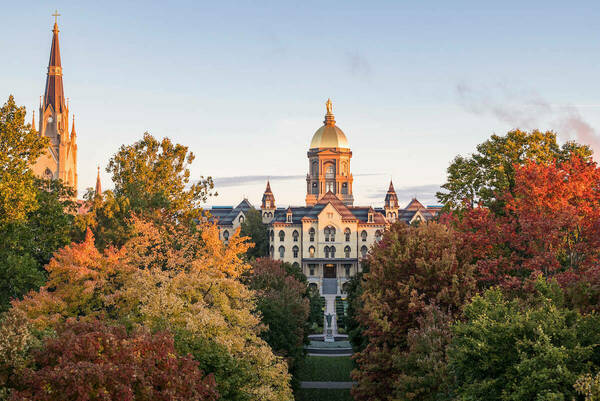
Twelve faculty members from the University of Notre Dame were recently awarded grants through the Notre Dame Research Faculty Research Support Program. Awarded researchers applied for either the initiation or regular grant and were from six different colleges and schools.
 Associate Vice President for Research Richard Billo
Associate Vice President for Research Richard Billo
In discussing the awards, Richard E. Billo, associate vice president for research and professor of computer science and engineering, said, “Each year, Notre Dame Research looks forward to supporting up and coming programs through our Internal Grant Program. This round of Faculty Research Support Grant recipients showcases research from a broad range of disciplines with the potential for far reaching impact.”
For the 2019 Faculty Research Support Regular Grant Program, the recipients are:
- A. Nilesh Fernando, assistant professor in the Department of Economics, for his research titled, “Promoting opportunity in urban labor markets: evidence from an internet platform-based experiment with small firms.”
- Kimberly Rollings, assistant professor of architecture, for her research called, “Cafeteria Assessment for Elementary Schools (CAFES).”
- Daniel Hobbins, associate professor of history at the Medieval Institute, for his project titled, “The great age of books: Mapping the communication networks of late medieval Europe.”
- Gregory V. Hartland, professor in the Department of Chemistry and Biochemistry, for his project called, “Super-resolution terahertz microscopy: A new imaging tool for biology and materials science.”
For the 2019 Faculty Research Support Initiation Grant Program, the recipients are:
- Michael J. Cramer, assistant director of the University of Notre Dame Environmental Research Center and concurrent associate professional specialist in the Department of Biological Sciences, for his research titled, “Role of ultrasonic vocalizations in communication in wild populations of deer mice.”
- Nan Z. Da, assistant professor in the Department of English, for her research called, “Where have the Chinese literary critics gone?”
- Karen Graubart, associate professor in the Department of History, for her project titled, “Fugitive Blackness: Finding African diasporic self-governance in the early circum-Caribbean.”
- Thomas Mustillo, associate professor in the Keough School of Global Affairs, for his project called, “The volatility of political attachments: A panel study of Mexicans.”
- John Onyango, associate professor in the School of Architecture, for his research titled, “The impacts of choice of energy code compliance path on whole-building energy performance for residential buildings in St. Joseph County, Indiana.”
- Susan Ostermann, assistant professor in the Keough School for Global Affairs, for her research called, “Conservatives against imperialism? The causes and consequences of conservative nationalism in the post-colonial world.”
- Christine Venter, director of the Legal Writing Program, for her project titled, “Dissenting from the bench: Performative jurisprudence as a necessary part of a thriving democracy.”
- Qiping Xu, assistant professor in the Department of Finance, for her project called, “Do higher taxes lead to brain drain? Evidence from state-level tax changes.”
The grant programs are announced during the autumn semester each year, with deadlines typically occurring in December. For more information about the Faculty Research Support Program, including how to apply, please visit https://research.nd.edu/our-services/funding-opportunities/faculty/internal-grants-programs/.
Contact:
Brandi R. Klingerman / Research Communications Specialist
Notre Dame Research / University of Notre Dame
bklinger@nd.edu / 574.631.8183
research.nd.edu / @UNDResearch
About Notre Dame Research:
The University of Notre Dame is a private research and teaching university inspired by its Catholic mission. Located in South Bend, Indiana, its researchers are advancing human understanding through research, scholarship, education, and creative endeavor in order to be a repository for knowledge and a powerful means for doing good in the world. For more information, please see research.nd.edu or @UNDResearch.